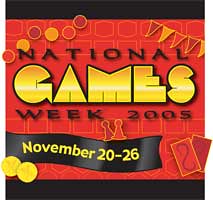It's that time of year again.
It was the kind of day Thanksgiving should be. Not to say I'm not thankful for the other people in my life, (most of them at least) and I would have been happy to spend the day with them, but it's nice to spend that day every now and then with the people that matter to you most.
Some random things I appreciate in no particular order: IKEA, craft sticks, Gevalia coffee, wireless networking, Moleskines, DirecTV, MP3s, open source software.
Okay, now to the core of the article. It's that time of year again: the annual "making out of the Christmas list."
This can be a bit of a bear. Fortunately, our extended family (at least Jodie's side – there really isn't much to my side of the extended family) does a random-draw gift exchange. That means the audience for my list is only three people – Jodie, my mom, and whoever drew me in the exchange. This year, that's Jodie's youngest brother Chris. (who, coincidentally, I drew in return.)
The problem I have when making this list isn't really what to put on it – it's figuring out what I want that they'll be comfortable buying. Personally, I'm more than happy to get gift certificates to Boards and Bits, Boulder Games, Games Surplus, Wargames Inc., or Warweb. But that doesn't fly so well under the tree in front of the rest of the family. They want to know what you got, not what you're gong to get. And then there's that lack of visceral satisfaction in getting an honest-to-gosh THING in your hands to open that morning.
So, that means putting real things on the list. Things that will be deliverable by Christmas.
My typical formula has been eight or nine boardgames and some miniatures (along with pointers/links to where to buy them), a handful of books, and a small handful of DVDs. I thought I'd break that formula this year, but it's looking like I'll just fall back to the old standby.
So, what games are on my list?
- Byzantium. I missed out on our group's playing of this over the weekend, but the combination of theme and designer are a must-own for me.
- Caylus. Ystari seems to be putting out some quality games. Haven't seen a new game shoot to #2 on the Geek like this in a while (ever?). It takes a lot to dethrone E&T.
- Ra. This is the lowest numbered game in The One Hundred that I've never played.
- Rommel in the Desert. The North African theatre is rapidly becoming my favorite campaign to game in WW2, rivaled only by the Battle of the Bulge. This definitely looks to be the most playable game on the whole campaign. While DAK2 (currently staring down at me from the top of my new desk) is probably the "most-detailed-while-still-playable" game covering the entire theatre, a five-map campaign game staying set up for more than a couple hours is not going to happen in my house.
- Crusader Rex. Keeping with the block theme. And keeping with the historical theme. I've had a thing for the Crusades lately. I keep staring at the Old Glory 15mm Crusades line knowing the 30% off sale ends Dec 15. Why do companies that sell goods typically NOT bought as gifts insist on sales in December? It's maddening!
- Panzer Grenadier: Deluxe Eastern Front. The new edition of the base game for this series – 8 mapboards, 112 scenarios. I think there's enough in there to keep me going for a while. Got to play the Bulge edition of Panzer Grenadier a couple weeks ago with Keith Todd, and had great fun.
- Indonesia. No, it won't get here by Xmas, but my birthday's only a couple weeks later...
- Sienna. It's all about theme this year, apparently. Last year's Zugames production was a bit pricey for how it apparently played, but this year's game looks much better.
- Railroad Tycoon. This should have been #1 on the list, in all honesty. However, it seems that Eagle has managed to do a complete 180 on their typical release. Instead of fantastic components and an iffy (at best) game, they've got a good game with bad components. I'm not asking someone to buy me a game where the boards can visibly warp during play until they get that straightened out. Then I buy it in a heartbeat.
- Are there ten games that I want enough to ask for them as gifts? There's a lot of candidates for this spot, most of them older games that I've never quite gotten to. Silverton, ZooSim, Trias, Runebound (2nd), Return of the Heroes, and others I can't quite come up with at the moment. Silverton and Runebound probably lead that list.
I don't know if Caylus or Byzantium will be available by Christmas (at least from any of the places I mentioned above) but most of the rest should be. I guess we'll just have to see what my brother-in-law wants to get me. He's played some games with his wife, Jodie, and I, but playing board games is definitely not on the top of his “things to do when I'm not at work” list.
Of course, his interests (outside of football and hockey) are very different than mine, so it'll be interesting to see what's on his list when he sends it to me.
I love surprises.

